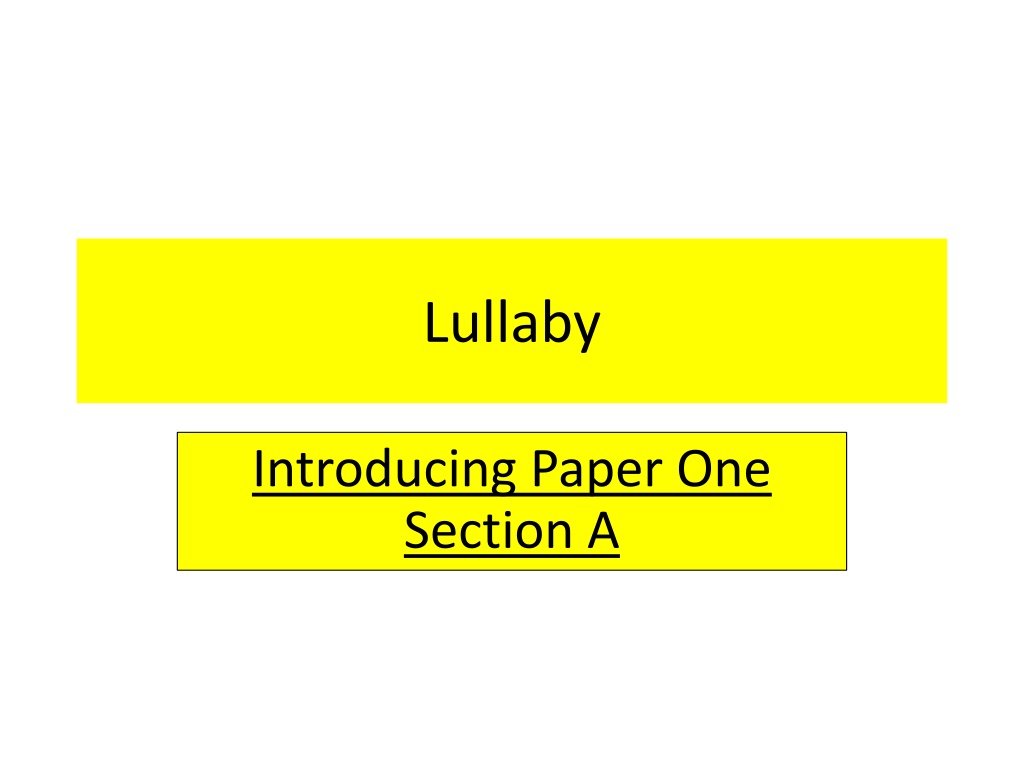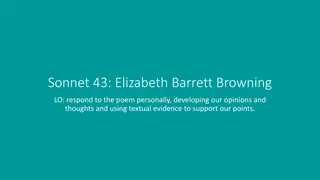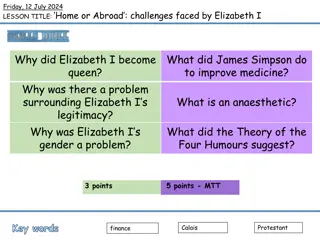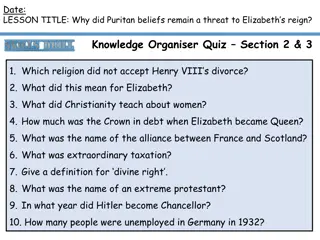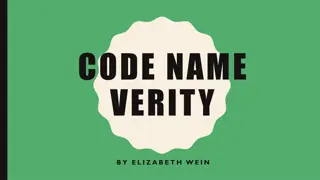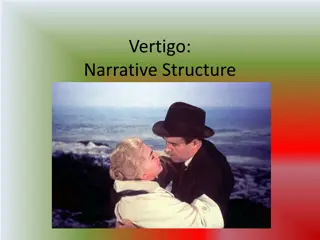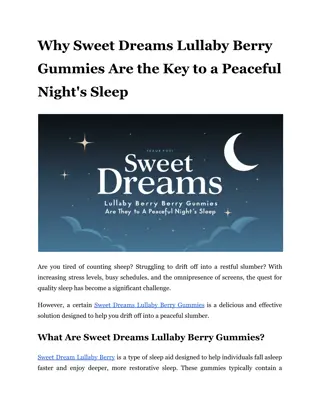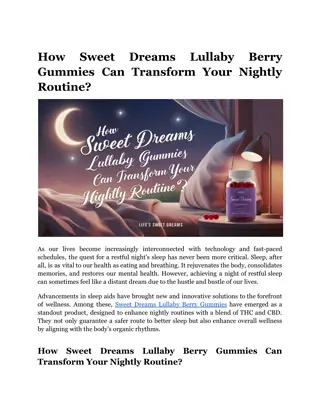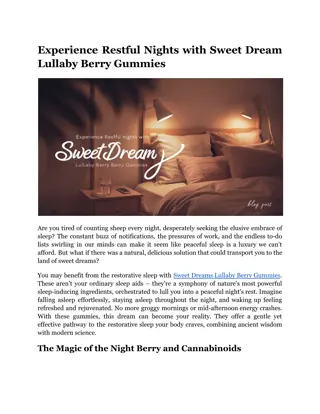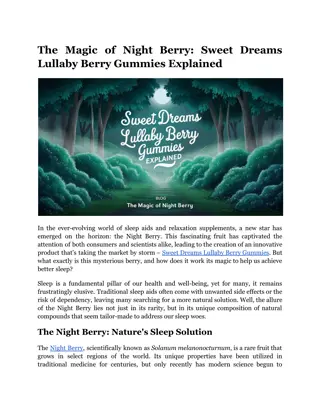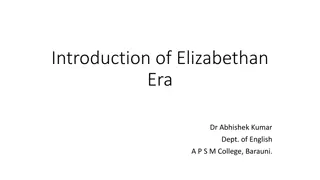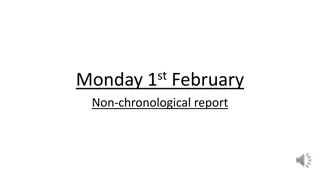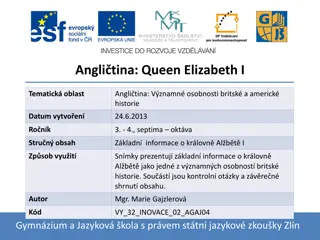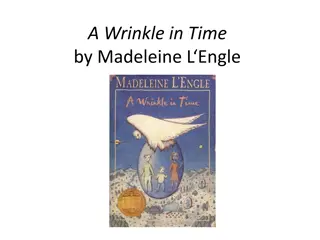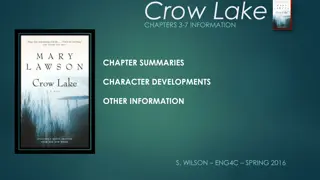Analysis of the Disappearance of Madeleine McCann and Lullaby by Elizabeth Berridge
The content discusses the mysterious disappearance of Madeleine McCann in 2007, the controversy surrounding her parents' actions, and the media scrutiny they faced. It also analyzes the relationship between a couple in the story "Lullaby" by Elizabeth Berridge, focusing on themes of insecurity and change. The disappearance of Madeleine and the couple's dynamics are juxtaposed, highlighting issues of trust, responsibility, and perception.
Download Presentation

Please find below an Image/Link to download the presentation.
The content on the website is provided AS IS for your information and personal use only. It may not be sold, licensed, or shared on other websites without obtaining consent from the author. Download presentation by click this link. If you encounter any issues during the download, it is possible that the publisher has removed the file from their server.
E N D
Presentation Transcript
Lullaby Introducing Paper One Section A
Who is this girl?
Madeleine McCann Madeleine Beth McCann (born 12 May 2003) disappeared on the evening of 3 May 2007 from her bed in a holiday apartment in Praia da Luz, a resort in the Algarve region of Portugal, sparking what one newspaper called "the most heavily reported missing- person case in modern history."Her whereabouts remain unknown. Madeleine was on holiday from the UK with her parents, Kate and Gerry McCann, her younger twin siblings, and a group of family friends and their children. She and the twins had been left asleep at 20:30 in the ground-floor apartment, while the McCanns and friends dined in a restaurant 50 metres (160 ft) away. The parents checked on the children throughout the evening, until Madeleine's mother discovered she was missing at 22:00.
Was it okay for the parents to leave the children while they went out to eat? The press and the public have been really critical of the parents. Is this fair? The disappearance attracted sustained international interest and saturation coverage in the UK press. The McCanns were subjected to intense scrutiny and false allegations of involvement in their daughter's death, particularly in the tabloid press and on Twitter.
What is this?
Lullabyby Elizabeth Berridge (1947) How does the author present the relationship between the couple in the first two paragraphs of the story? What does he do for a living? She had never been quite sure about it, but he was convinced. It s a great idea, a marvellous idea, he said, but of course if you don t want to come out with me when I m on leave, just say so. So she had given in. She always did. Life with him was precarious; always had been. She had sudden terrible fears of him leaving her. Suddenly walking from the room, out of the house, knowing he had gone on to some other life and needed no one. It s being in the air so much, doing so much flying. she thought. It must do something to you. Hanging on to a cloud and never coming down only of course you fell through a cloud.
When they had the child it was better, for a time. Then the juggling began. She could keep them both spinning equably, dexterously, for a time; father and son, son and father, but then her hand would become tired, the trick fail. This was such a time, so she said yes, and they went to friend of his who had cashed in on the pre-war vanity of people who wanted their voices recorded. Only a few left, he said. Wistfully he looked over the wax discs. Still, it was fun while it lasted. Did I tell you the story of the man who was too nervous to propose on the spot? Yes, he was told. Oh. He was obviously disappointed, Well, what are you going to do? It was explained. Why, that s wonderful he exclaimed. That s come on, let s hear you. What is she not sure about? What effect is achieved by the author s delay in explaining what the couple have disagreed about? Explain the metaphor used in She could keep them both spinning equably, dexterously, for a time
They tried it out that evening and sat listening in the next room. The child was in his cot, but was talking to himself in a queer half-language of his own. He sang a little, chuckled and made astonished noises. Then the record was started. Go to sleep, darling, came his mother s voice from the black box. There was a pause, then Hush now, bye-byes. The baby stopped murmuring and settled down. Then the voice said: Everything s all right, Mama s here. The child seemed to be asleep, but they let the record run to the end. It won t disturb him, she whispered, and gazed as the voice sang, a little self-consciously spinning from under the needle. What s to be done with the baby son A little breathlessly the record stopped, clicked. The next room was silent. There! he said triumphant. That s all right, isn t it? He only needs to hear your voice and off he goes. She smiled. It did seem a good idea. Come on, he said, let s go. Voice recording technology was innovative at the time. How do the couple plan to use it?
They did it once or twice after that, until he had to return to his station. But he couldn t forget it. You must make one for me, he wrote. But somehow she never did. She hated her voice spinning off the black disc; she felt as if her whole being was caught beneath the sharp needle, dragged round like a piece of fluff in the shining grooves. When he next came on leave he said: Sanders tells me we positively must see that film at the Empire. It s tremendous. The Empire? she said. It s a long way. He looked at her with the peculiarly blank expression he assumed when he was determined to do something in the face of any obstacle. We ve got the record, he said. We ll be home by ten if we go early. Even though the recording succeeds in getting the baby to sleep, his mother feels uncomfortable with it. She felt as if her whole being was caught beneath the sharp needle, dragged round like a piece of fluff in the shining groove. How might we interpret this sentence as a comment on the woman s life and relationship with her husband?
Why does the woman use the imperative form of the verb in the sentence, Her fear was always there, but it must not spoil his evening ? So that evening she put the baby to bed earlier, and they set the record off as they went out of the door. In the hall, he stopped suddenly and caught her in his arms. You re sure you feel all right about leaving him, darling? he asked. I m a selfish brute. She laughed. Her fear was always there, but it must not spoil his evening, and the idea of him being worried somehow strengthened her. He ll be all right, she said firmly. Don t worry. Together they walked down the road. What a wind! she said. Back in the nursery the wind in a sudden gust shifted aside the blackout curtain they had always meant to fix. The house stood on a corner and took the full force of any storm. More of a gale, he said.
The nightlight, usually unwavering in its saucer, flickered unsteadily; a tiny edge of the curtain was blown across and remained a little above it. From his cot the baby watched the flame grow bright. He chuckled and sang to himself. Then his mother s voice came gently. Go to sleep, darling. He turned over and put his thumb in his mouth. But the brightness still fascinated him; he wanted to tell his mother about it. Hush now, bye-byes. Obediently he closed his eyes. A sudden intensity of light swept across his eyelids; the curtains were blazing. He opened his mouth to scream with sudden inexplicable fear, but across the lighted room came the trusted voice that was with him all day, You re quite all right. Mama s here. He looked about, where was she? He didn t like it. The wind rushed round the corner and swept the fire across to the chest of drawers cottonwool, picture-books. The baby was standing in his cot now, gripping the rail and shaking, his eyes wide and black with fear, almost islanded by flame and across the room came the lullaby we ll put him away for a rainy day How does the author s description of the baby convey a sense of his innocence and rising fear?
As they got off the bus, she gripped his arm. The journey had passed in silence, but now it was as if she lay beneath the sharp needle, caught in the spinning grooves. Did you hum that song we made up for the baby just then? Her voice was edged, and he looked at her, startled. No, he said, I could have sworn you were singing it. For a moment they looked at one another. Then: Taxi! he shouted. Taxi! The writer gives no details at the end of the story beyond the man s call for a taxi. What is your response to the conclusion of the story? To what extent do you consider this story to be a criticism of the man, the woman or both characters? Write your responses to these questions in your books.
Highlight and annotate the words and phrases in which the husband s character is presented. Highlight and annotate the words and phrases which tell us about the mother s character.
The author does not name any of the characters. What is the effect of the use of the third person narrative perspective and the pronouns she , he and they instead of proper nouns? Write your response to this question in your books Level 4: perceptive Level 3: clear Level 2:attempts Level 1: limited
How do I answer Question 1? It is worth 4 marks. One mark for each correct piece of information. The text is fiction The question will direct you to a specific part of the text. This question is intended to be straightforward. It will be explicit (clear information). Level 4: perceptive Level 3: clear Level 2:attempts Level 1: limited
5 minutes Question 1 Write down four things you learn about the mother from this section of the story She had never been quite sure about it, but he was convinced. It s a great idea, a marvellous idea, he said, but of course if you don t want to come out with me when I m on leave, just say so. So she had given in. She always did. Life with him was precarious; always had been. She had sudden terrible fears of him leaving her. Suddenly walking from the room, out of the house, knowing he had gone on to some other life and needed no one. It s being in the air so much, doing so much flying. she thought. It must do something to you. Hanging on to a cloud and never coming down only of course you fell through a cloud. When they had the child it was better, for a time. Then the juggling began. She could keep them both spinning equably, dexterously, for a time; father and son, son and father, but then her hand would become tired, the trick fail. Level 4: perceptive Level 3: clear Level 2:attempts Level 1: limited
Self assessment: one mark for each correct answer (up to 4 marks) Answers She wasn t sure about recording her voice She always gave in to her husband She was scared he would leave her She thought her husband had something wrong with him (caused by flying) She had to juggle keeping her husband and her child happy She found the juggling tiring
How do I answer question 2? Question 2 is worth 8 marks. For this question you need to look at how the writer uses language to describe an event. You need to comment on words and phrases, language features, techniques and sentence forms. Level 4: perceptive Level 3: clear Level 2:attempts Level 1: limited
Language Techniques What effect do they have on the reader? Simile Metaphor Personification Alliteration Onomatopoeia Rule of three Emotive language Rhetorical Question Repetition Adjective Verb Phrase Clause Simple sentence Compound sentence Complex sentence Punctuation Purple literary language features Red- Grammar and punctuation language features Level 4: perceptive Level 3: clear Level 2:attempts Level 1: limited
LANGUAGE= WORDS Always talk about WORDS. If you mention a device you MUST analyse WORDS within it. Eg. The writer uses a metaphor, and the use of the word (or verb, adjective etc)??? makes the reader feel Level 4: perceptive Level 3: clear Level 2:attempts Level 1: limited
Consider the language used, and the effect Once a skunk had come plodding through our camp and it had sounded like a stegosaurus. I peered and peered, but I couldn t see anything but those two wide-set eyes staring from the near distance like eyes in a cartoon. Level 4: perceptive Level 3: clear Level 2:attempts Level 1: limited
Consider the language used, and its effect They are Nomura s jellyfish, an authentic horror of the deep about to launch their latest assault on a helpless Japan. No one is sure about the reasons for the slimy plague. Level 4: perceptive Level 3: clear Level 2:attempts Level 1: limited
Analyse the language use, and its effect Contact with the outside world is invariably disastrous for an isolated tribe to escape a rubber production boom that enslaved many Indians. Level 4: perceptive Level 3: clear Level 2:attempts Level 1: limited
When responding to Q2, you need to answer clearly so using P.E.E could be helpful. P (point/position): the point you want to make. E (Evidence): a quotation to prove your point is valid E (Explanation/ evaluation/ exploration/ extension/ effect/ EXTRA!): the really meaty bit of your paragraph, where you develop your point, and analyse words and their effects. Use the phrase The word to show that you are focussed on language use. Refer to the writer, to show that you know the writer made choices about language use Level 4: perceptive Level 3: clear Level 2:attempts Level 1: limited
How does the writer use language here to show the thoughts and feelings of the characters? You could include: Words and phrases, Language features and techniques, Sentence forms 12 minutes They tried it out that evening and sat listening in the next room. The child was in his cot, but was talking to himself in a queer half-language of his own. He sang a little, chuckled and made astonished noises. Then the record was started. Go to sleep, darling, came his mother s voice from the black box. There was a pause, then Hush now, bye-byes. The baby stopped murmuring and settled down. Then the voice said: Everything s all right, Mama s here. The child seemed to be asleep, but they let the record run to the end. It won t disturb him, she whispered, and gazed as the voice sang, a little self-consciously spinning from under the needle. What s to be done with the baby son A little breathlessly the record stopped, clicked. The next room was silent. There! he said triumphant. That s all right, isn t it? He only needs to hear your voice and off he goes. She smiled. It did seem a good idea. Come on, he said, let s go. They did it once or twice after that, until he had to return to his station. But he couldn t forget it. You must make one for me, he wrote. But somehow she never did. She hated her voice spinning off the black disc; she felt as if her whole being was caught beneath the sharp needle, dragged round like a piece of fluff in the shining grooves. Level 4: perceptive Level 3: clear Level 2:attempts Level 1: limited
Assess yourself! Q2 mark scheme Level 4 : 7-8 marks Level 3: 5-6 marks Level 2: 3-4 marks Level 1: 1-2 marks Detailed, perceptive, sophisticated Clear understanding of language Some understanding, attempts to comment Simple, limited Did you refer to: words and the writer?
Level 4: perceptive Level 3: clear Level 2:attempts Level 1: limited Question 3: How has the writer structured the text to build tension for the reader across the whole extract? Focus on the key words, tension and structure. Look first for tension in the text. Then consider how the writer has created and built this tension.
Assess yourself! Q3 mark scheme Level 4 : 7-8 marks Level 3: 5-6 marks Level 2: 3-4 marks Level 1: 1-2 marks Detailed, perceptive, sophisticated Clear understanding of structure Some understanding, attempts to comment Simple, limited
Level 4: perceptive Level 3: clear Level 2:attempts Level 1: limited Question 4 Question 4 is worth 20 marks You need to: -Understand what the writer has sought to achieve in the passage - Evaluate the effectiveness of the writer s choices - Selecting relevant quotations and textual references to support your views.
Level 4: perceptive Level 3: clear Level 2:attempts Level 1: limited Question 4 Question 4 is the big mark question, so you need to spend the most time on it. It requires you to have an opinion, and to critically evaluate the whole extract. You need to use P.E.E. Try not to repeat points you have already made in questions 2 and 3.
Q4 Top Tips Select a range of quotations Use subject terminology to identify the writer s techniques. This indicates that Which makes us think that . implying that . Which makes the reader feel that . Here the writer is Gives us the impression that . It is as if .. Suggesting . Level 4: perceptive Level 3: clear Level 2:attempts Level 1: limited
4. A student, having read this section of the text said: The writer creates fear for the reader. To what extent do you agree? In your response, you could: Write about your own impression of the character. Evaluate how the writer has created these impressions. support your opinions with quotations from the text. Level 4: perceptive Level 3: clear Level 2:attempts Level 1: limited
Assess yourself! Q4 mark scheme Detailed, perceptive, sophisticated interpretation Level 4 : 16-20 marks Level 3: 11-15 marks Level 2: 6-10 marks Level 1: 1-5marks Simple, limited Clear understanding of language/structure/ text Some understanding, attempts to comment
